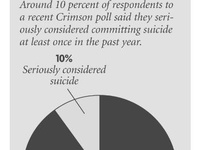
Kristin M. Waller ’05, who suffers from depression, says she would have had nowhere to go if the Administrative Board had required her to take time off.
When around two dozen Eliot House students were facing academic problems last May, Eliot House Senior Tutor Oona Ceder ’90 sent an e-mail to Master Lino Pertile questioning the College’s treatment of students with mental health problems.
In the e-mail, which was circulated among a number of administrators and obtained by The Crimson, Ceder discusses the idea that the College allows students with mental health problems to remain in school for too long.
Ceder writes that the University should consider “whether we serve our students’ overall interests with the current UHS and Ad Board protocol for accommodations,” explaining that they allow students to hang on rather than getting the break and fresh start that they need.
In one e-mail, University President Lawrence H. Summers indicates that he is inclined to agree.
“Is Oona’s view on the need for earlier withdrawals as I suspect right[?]” he writes.
Summers now says that he was referring to “academic performance withdrawals,” not cases of students with mental health problems. And he adds that his comment was based on past suggestions to him that these students who are struggling academically would be better off leaving campus than remaining in school.
“A number of people had suggested to me at various points that we sometimes gave students a break and had them stay in situations where they would have been more likely to have improved their situation if they took a semester off,” he said last night.
Top administrators charged with overseeing mental health services echo the idea that time off can be the best option for students with severe mental illness—and assert that students should take this route more often.
But many students with serious mental health problems say that more than just presenting them with the option, College administrators often pressured them to leave Harvard and deal with their problems at home.
They say that Harvard is overly eager to get them off campus and is not committed enough to helping them navigate Harvard’s mental health resources while attending classes.
And as universities struggle to deal with the growing mental health problem, as well as a changing legal terrain, some students and experts say concerns about liability overly motivate administrators’ actions.
The Most Serious Case
While Harvard has not had to cope with three dramatic suicides this year as New York University did this fall, the University has in the past faced the thorny legal issues that surround serious student mental health issues and particularly suicide.
In 1998, a female undergraduate’s family sued the University after their daughter was stabbed to death by her Dunster House roommate, who committed suicide after the attack. The student’s family alleged that the College should have recognized the roommate’s instability when she missed three exams and began behaving erratically.
The case was settled out of court.
Read more in News
Chapel May Remain in Cambridge Permanently















